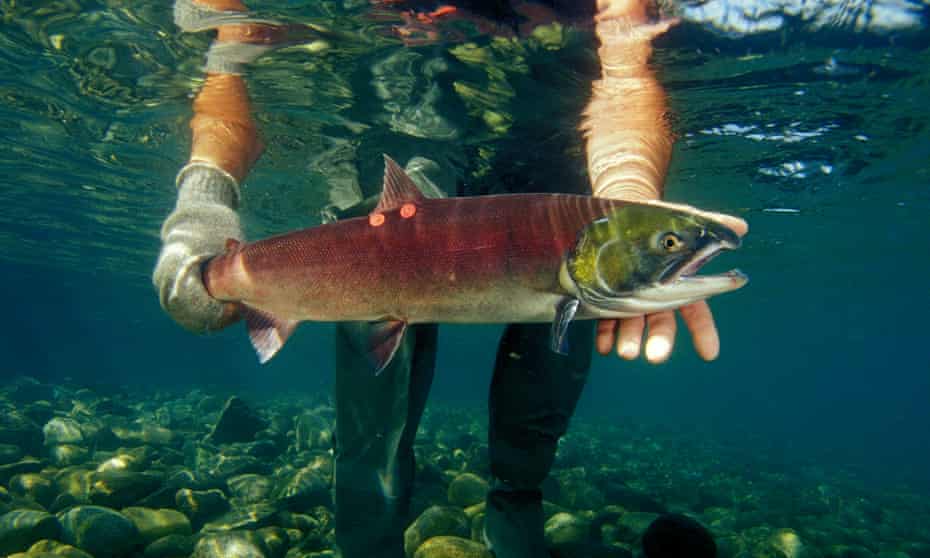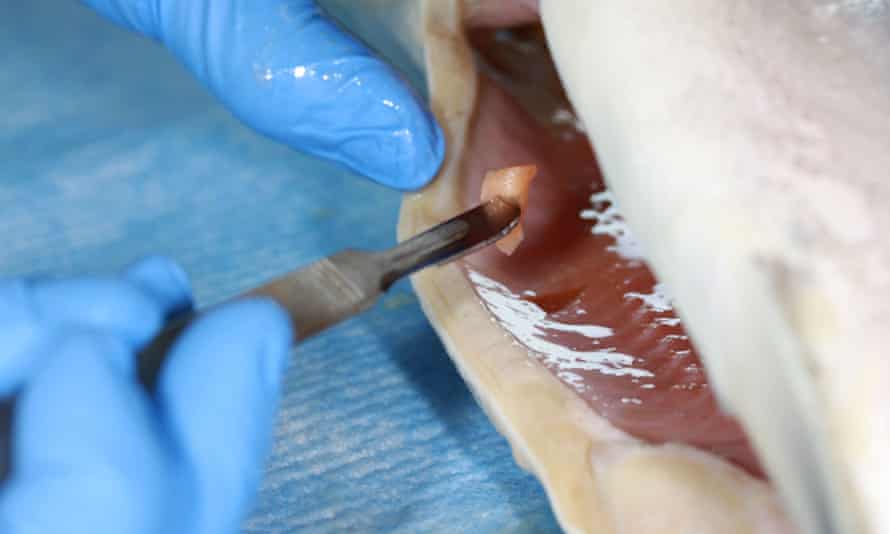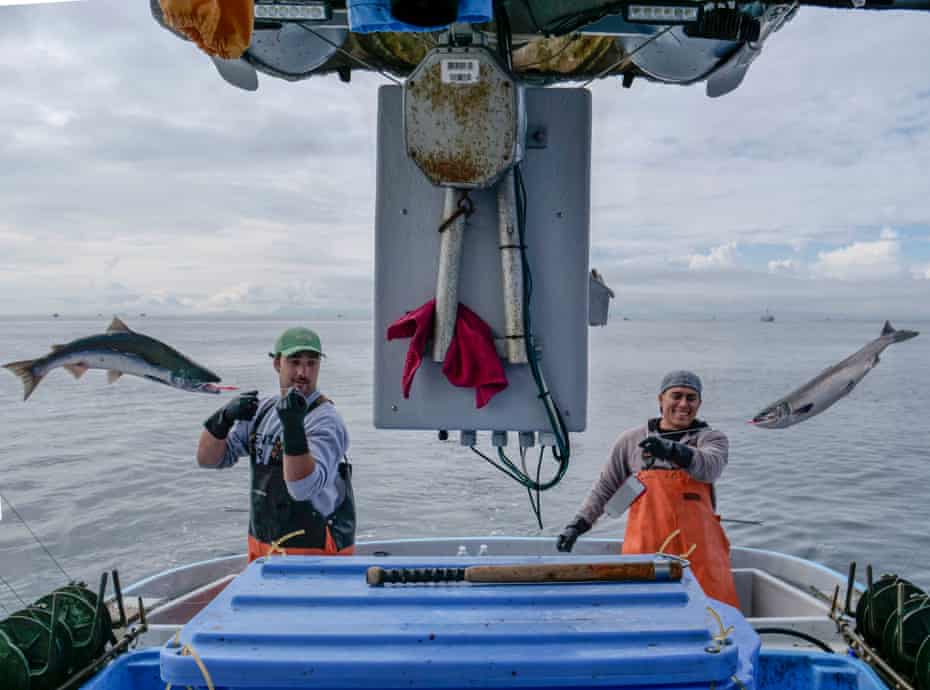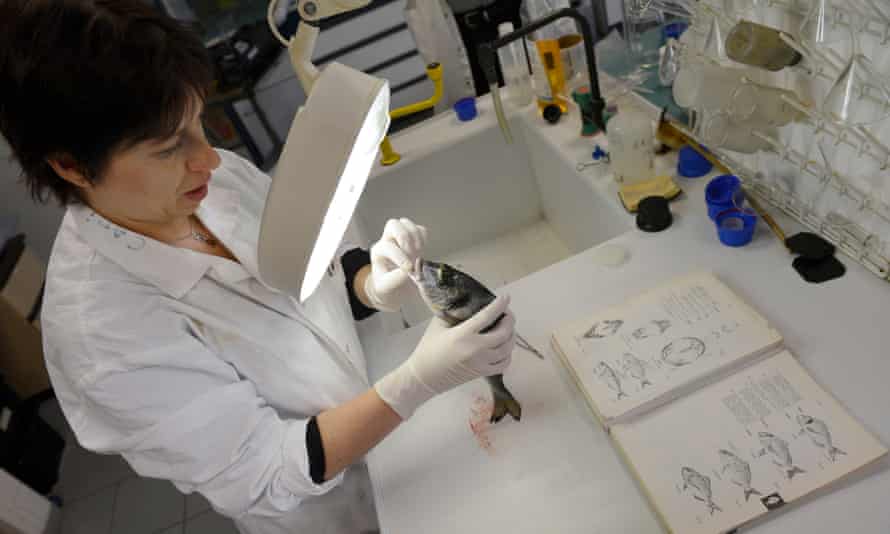The first notable thing about the wild salmon fillet Dane Chauvel shows me is its colour – a rich red that, even over FaceTime, makes my mouth water. The second notable thing is that it’s definitely salmon.
This might not seem like a debatable fact. Chauvel is co-founder of Organic Ocean Seafood in Vancouver, Canada, housed in a historic building at the mouth of the 854-mile (1,375km) Fraser River, one of Canada’s main salmon courses. The company supplies many high-end restaurants, and wild-caught salmon makes up a large proportion of its sales.
But as the exclusive Guardian Seascape report indicating the extent of global seafood fraud has shown, it’s not always so easy to tell what your fish actually is. In the analysis of 44 studies worldwide, more than one in three seafood samples of 9,000 analysed were mislabelled.
Chauvel is not surprised by the revelations. “The fishing industry is a mess,” he says. “It’s dysfunctional.”
He can prove, however, that the salmon in his hands is a salmon, because the fish has been included in a random DNA testing programme – the world’s first.

To remove any doubts about its seafood for top-end clients, Organic Ocean worked with the University of Guelph in Ontario, where researchers had pioneered DNA “barcoding” to identify living species. Together they created an independent authentication programme for Organic Ocean’s fish, which even identifies rivers of origin.
DNA barcoding involves sequencing a short, specific section of a particular gene from a sample and comparing that with a library of barcodes from known species. The process can be compared to the way barcodes identify shop products.
Chauvel shows me, on FaceTime, the company’s cold-storage room. Here, stacks of big blue storage boxes are filled with processed and frozen salmon, halibut, lingcod and tuna.

Many of these fish were caught by First Nations communities, in what Chauvel calls “a happy partnership based on shared values of conservation and environmental stewardship”. Indigenous commercial fishers handle their catches carefully, preserving the beautiful skin colour of salmon, and creating a narrative of reconciliation: for nearly 100 years, First Nations communities were largely banned from commercial fishing in the Fraser River and other big rivers in British Columbia.
The fish in the blue boxes were identified when caught and tagged with a unique ID, including their species name, to track them during processing.
“Without telling us, someone from Guelph shows up and takes random samples from here,” Chauvel explains. The samples are sent to the University of Guelph’s Hanner Lab for DNA analysis. The lab posts the results on Organic Ocean’s public website.
Letting a third party publish its findings online enhances transparency, he says. “I hope using DNA becomes more commonplace in the industry. It’s been a great business advantage for us.”
Robert Hanner, who runs the lab at Guelph, would happily carry out DNA authentication for others in the seafood industry, but says companies aren’t interested in voluntary testing. Nor has there been much interest from Canada’s food regulator, the Canadian Food Inspection Agency (CFIA), even though DNA identification has been used since 2008 to document widespread seafood mislabelling in Canada. “Nothing’s changed in terms of regulation or enforcement,” Hanner says.
That might seem surprising, given that the CFIA recently exposed mislabelling in seafood supply chains. Working with Hanner, the regulator found 20% of the imported seafood tested was already mislabelled when it arrived in Canada. The mislabelling increased to 27% at wholesaler level, and 40% at retail level.

“Wherever we test in Canada, we find 25 to 40% of samples are mislabelled,” Hanner says. And it’s never a higher-cost species labelled as a lower-cost one. “This is not just a problem in Canada. It’s international.”
Owing to the high and sustained level of mislabelling, Hanner believes organised crime has infiltrated the seafood industry. A single shipping container filled with farmed pangasius catfish fillets sold as red snapper, or some other higher-value fish, can net C$1m (GBP570,000) in profit. In the unlikely event the fraud is caught, the fine might be C$50,000, he says.
Canada’s weak seafood supply chain traceability standards mean people are often not getting the fish they paid for. They are also spending an estimated C$160m a year unknowingly buying illegal fish, according to a new report from Oceana Canada, an international organisation focused on oceans.
“Eating less fish is not the solution,” says Josh Laughren, Oceana Canada’s executive director. “Fish are an important and healthy source of protein.” Rather, he says, the problem can only be solved by governments using regulations and enforcement.
Oceana would like to see boat-to-plate traceability: accurate tracking and identification from harvest to the point of sale, as provided by Organic Ocean. Spot checks along the supply chain using DNA barcoding would help to give consumers more confidence in what they are buying.
Although Canada committed to setting up traceability standards in 2019, it has yet to act on this. The EU and US do have traceability standards, but rarely use DNA barcoding.

Analysis of the most recent studies show EU and US mislabelling rates are only slightly better than Canada’s, even though EU labelling requirements are considered the most robust in the world, requiring the scientific names of fish species and geographical origin, among other information. But while there is slightly less mislabelling in EU supermarkets, the problem persists at small markets and restaurants, says Donna-Maree Cawthorn, a researcher at the University of Mpumalanga in South Africa.
Cawthorn’s 2018 study found that more than 80% of samples sold as snapper in markets and restaurants in various cities in the UK were improperly labelled. The “snapper” represented an astounding 38 different species, including many reef-dwelling species that are probably threatened by habitat degradation and overfishing.
“It’s not just a few bad guys,” says Cawthorn. “The global seafood industry is dysfunctional. That makes it very difficult to manage fish stocks sustainably.”
A good place to start would be to have a single common name for each species. Something like 12,000 different species are sold as seafood, and each species can have numerous common names. The EU requirement to use the species’ unique scientific name is the right approach, says Cawthorn, but it has to be enforced.
Certification programmes can help reduce mislabelling, too. The Marine Stewardship Council (MSC), the world’s leading seafood certifier, recently used DNA barcoding to verify that 99% of 1,409 of products sampled between 2009 and 2016 were correctly labelled. The MSC programme works, says Cawthorn – but it’s voluntary, and costly to join, although she acknowledges that MSC is trying to find ways to help small-scale fishers in the developing world become certified.
In Norway, some seafood companies have started to use blockchain technology to create a transparent, accountable record of where each of their fish comes from. Blockchain can ensure traceability, but tracing the voyage of a fish is pointless if it was mislabelled from the beginning – meaning there is still a need for DNA authentication. And this effort remains voluntary.
Until public pressure is brought to bear on the market, truly transparent companies such as Organic Ocean will remain outliers. “It’s interesting that many people know, and care more, about the provenance of the wine they drink than the seafood they eat,” says Cawthorn.